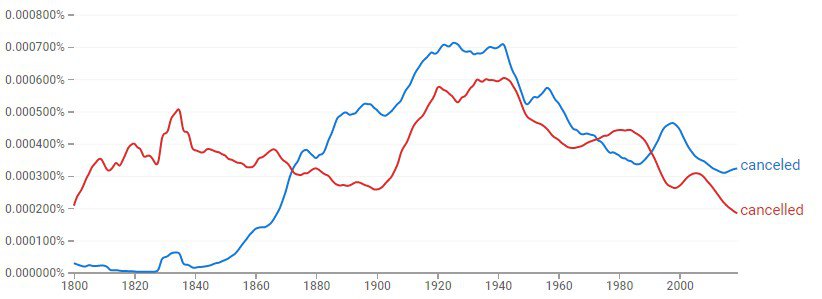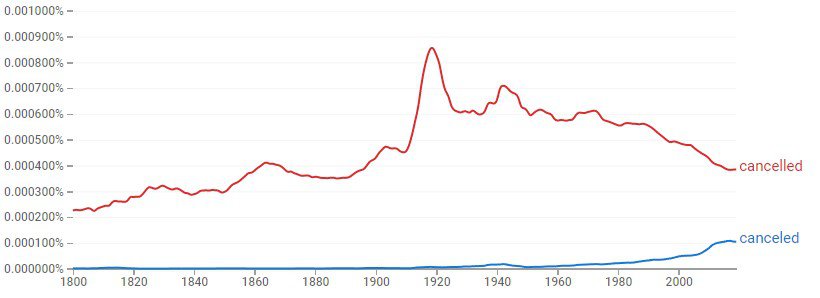From cancel culture to cancelled flights, the word ‘cancel’ can present itself in different ways, depending on the context. Writers of all levels have struggled with words like this. Let’s get into the details on the difference between cancelled and canceled and when to use them.
Canceled or Cancelled?
Canceled, with one L, is used in American English, and cancelled, with two L’s, is preferred in British English and outside of the U.S.
Why Cancelled and Canceled are Different
Cancelled and canceled are only different in spelling and origin. Obviously, one word has a double L, while the other only has one. But the most significant difference between them is that cancelled is British English, while canceled is American English.
So, what’s the logic behind American English’s use of a single L? In the 19th century, Noah Webster of the Webster’s Dictionary thought some words kept their value with a letter removed.
Even with a simplified spelling, canceled still sounds and means the same as cancelled. The same is accurate with other American spellings, like honor/honour and color/colour.
Thanks to Noah Webster’s dictionaries, these American spellings became official. However, these orthographic variations were already present before.
The present progressive form of the verb may also use single or double L. This means canceling and cancelling are also acceptable.
When to Use Canceled vs. Cancelled
Spelling variations of the same word can be confusing. Like, authorise vs authorize, or apologise vs apologize.
Use canceled when writing in American English, and use cancelled for British English. Don’t get confused about their definitions because they are the same. Cancelled and canceled come from the simple verb form, cancel, which means:
- To annul, make void, or revoke. E.g., She canceled/cancelled her transaction.
- To call off an event or occurrence. E.g., My sister’s flight was canceled/cancelled.
- To compensate for one another. E.g., Our opposing votes always cancel each other.
Here are other examples that use American English and British English in a sentence:
- Allan canceled our reservation because I already had dinner.
- Allan cancelled our reservation because I have already had dinner.
Here’s a bonus lesson, which you’ll find helpful later on: American English usually uses simple past tense. And British English uses present perfect tense.
Other words with spelling differences that follow the same guideline include modeled and modelled and bejeweled and bejewelled.
More American Examples
Take a look at these other American examples of canceled and canceling in a sentence:
Many flights have been canceled, forcing more passengers to connect at big and increasingly crowded hubs. [New York Times]
Under current law, it is scheduled to rise to 6.8% on July 1, an increase that Obama has called for canceling. [Los Angeles Times]
Moriarty added that an earlier cancellation could have allowed the slot to be resold, which would have resulted in a credit being issued. [Boston Globe]
But there’s a catch. Some verbs that end in L use a double L for their American past tense. Here are some examples:
- Rebel, rebelled, and rebelling.
- Compel, compelled, and compelling.
- Enrol/Enroll, enrolled, and enrolling.
- Dispel, dispelled, and dispelling.
If you want to know whether you should double the L or not, try to pronounce the word. If the final syllable is heavy, a double L is the preferred spelling. If not, use single L. Some American publications also use cancelled to emphasize the last syllable.
More British Examples
Check out these British differences in spelling for cancelled and cancelling in a sentence. Note the double-L spelling:
It emerged yesterday that the girl, named only as Merthe, had gone into hiding with her family after cancelling the party. [Irish Times]
Allegations of black market touting by foreign Olympic committees could see thousands of tickets cancelled. [Independent]
British English vs. American English
British English and American English differ in sentence structure and spelling. One instance is when you maintain or double the last letter when adding inflections like -ed, -ing, -er, and -or.
You already know that British English always doubles the L. Hence the word cancelled. And American English uses a single L, except when you stress the last syllable.
To tell the difference between the two, just remember that American books and publications use words that are shorter most of the time for an American audience. The terms have “reformed” spellings which many Americans advocated for in the past. Some pushed the change as a form of protest, while others aimed to simplify the language.
Even American sentences are shorter. Remember our previous example on using simple past and present perfect tenses? Americans would say, “I already had dinner,” while British people would say, “I have already had dinner”.
British and American Usage Trends
As the Ngram below shows, American English has only recently adopted the one-l spellings of canceled, canceling, etc., and the change is not fully engrained in the American language. In web searches of American publications covering the last couple of years, cancelled and cancelling still appear about once for every five instances of canceled and canceling. Outside the U.S., meanwhile, the one-l spellings appear only very rarely. This is true even in Canada, which is usually friendlier to American spelling idiosyncrasies than is the rest of the English-speaking world.

Similar Ngrams for British books (shown below)show the one-l forms beginning to gain ground in British English—likely due to the strong American influence on web-only publications from around the world—but the two-l forms still prevail by a large margin.

Spelling Exception: Cancellation
Now that you know the difference between canceled and cancelled, let’s talk about cancellation. This word is a spelling exception because it’s the standard term in American and British English.
No matter who your audience is, use cancellation instead of cancelation. Take a look at these examples:
- British Airways suggested rescheduling instead of a flight cancellation.
- I’m disappointed about the cancellation of Beyonce’s concert.
- You better go if you don’t want to pay a cancellation fee of £80.
- An annulment is a proper term for the cancellation of a marriage.
- She requested a cancellation of the event because she was afraid of being cancelled.
Cancelable or Cancellable
Cancelable, with one L, is the adjectival form of cancel and is the preferred spelling in American English. Cancellable with two L’s, is the preferred spelling outside of the U.S.
Does Canadian English Use Canceled or Cancelled?
Canadian English uses two L’s when spelling cancelled, cancelling etc. American and Canadian accents might sound the same, but their writing styles in English are very distinct.
Canadian English also uses other longer words as a spelling rule. It adopts “ou” in words like humour, behaviour, and romour. And they prefer “er” instead of “re,” as in centre and theatre.
Canadian Example
Student groups say organizers of the Canadian Grand Prix overreacted in cancelling the free opening day of the event. [CBC]
Does Australian English Use Canceled or Cancelled?
Australians also spells the word with a double L like Canadian and British spellings. Australian English uses cancel, cancelled, cancelling, and cancellation. Australians also spell humour instead of humor and favourite instead of favorite.
In Conclusion
Both canceled and cancelled are acceptable varieties of English, correct spellings, and have the same definitions. However, American English employs the version with a single L, while British English prefers double L. The key to avoiding any confusion is remembering that Americans use simpler spelling.
Remember to consider who your target audience is before using canceled or cancelled. Otherwise, people might cancel you!